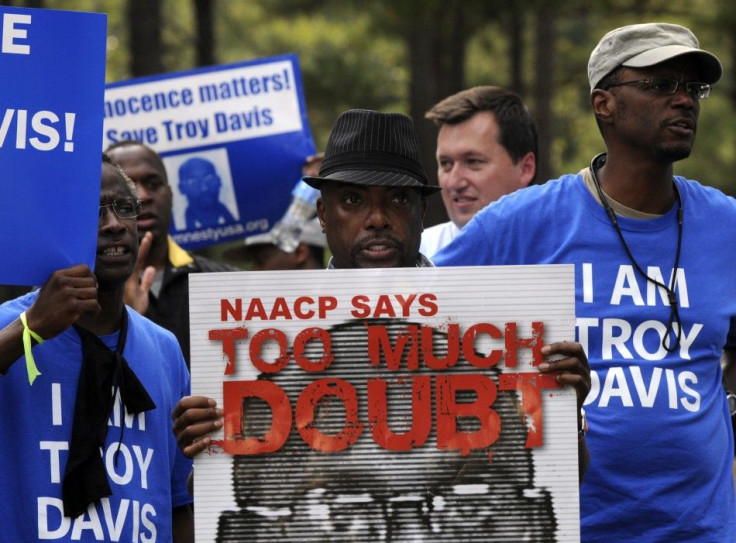Troy Davis: Supporters Recall the 'Martyr and Foot Soldier' at Funeral in Georgia

Troy Anthony Davis, the Georgia man who was arrested in 1989 for the murder of an off-duty Savannah police officer, had claimed his innocence for two decades. But despite his continuous claims, Davis couldn't convince the authorities and was executed on Sept. 21.
On Saturday, around 1000 supporters of Davis, including his family and friends, gathered at his funeral inside Savannah's Jonesville Baptist Church and mourned him as a martyr and foot soldier. They vowed to keep fighting the death sentence.
There was repeated chanting of the slogan, I am Troy Davis - the one which was adopted by the activists during Davis' trial.
It was Benjamin Todd Jealous, president of the NAACP, who brought the crowd to its feet. Jealous said that Davis had claimed his innocence even in his last words.
Davis, who was 19 when the 27-year-old MacPhail was killed, told the slain police officer's relatives from the death chamber that he was innocent.
I am innocent. The incident that happened that night is not my fault. I did not have a gun. All I can ask ... is that you look deeper into this case so that you really can finally see the truth, the 42-year-old said.
Davis also urged people to continue to fight and look deeper into this case so you can finally see the truth.
We're going to keep on fighting until his name is finally cleared and Georgia admits what it has done, CNN quoted Jealous as saying. We're going to keep on fighting until the death penalty is abolished and this can never be done to anyone else.
Davis was 19 years old when he was arrested for the murder. His supporters believed that racism had played a major role in Davis's execution since he was black and the slain cop was white.
No murder weapon was found and there was no DNA evidence. Ten witnesses in the case later signed affidavits withdrawing their statements, saying police coerced them into accusing Davis. Some even said that there was another man who claimed to have shot MacPhail.
Davis's supporters compared his case with that of Casey Anthony where the alleged child-killer was set free despite having a body of evidence against her. Casey Anthony is offered a book deal, but Troy Davis is only offered his last meal. Wake up America, our justice system is screwed, wrote Ryan Hunt on Twitter.
According to Jason Ewart, a defense attorney who witnessed the execution, Davis was still optimistic on the last day of his life because his death warrants had been stayed thrice since 2007.
Many have spoken of Troy as a symbol, Ewart said. He was the soul of something profound.
Those attended the funeral on Saturday included Davis's sisters Martina Correia and Kimberly Davis and his nephew, 17-year-old DeJaun Davis-Correia.
Davis-Correia said that his uncle, who spent his entire life in prison, used to talk with him over phone and help him with homework. Davis even put his tests and exams on his calendar.
Davis's execution had gained international attention and more than 630,000 people signed petitions urging clemency for him. Though their efforts couldn't save his life, yet his execution has made Davis the poster boy for a global movement to eliminate death penalty.
© Copyright IBTimes 2024. All rights reserved.












